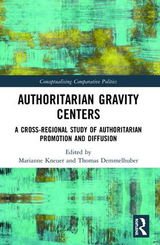
Networking with Chinese characteristics: China’s party-to-party relations in Asia
Bader, Julia / Christine HackeneschExternal Publications (2020)
in: Marianne Kneuer / Thomas Demmelhuber (eds.), Authoritarian gravity centres: a cross-regional study of authoritarian promotion and diffusion, New York: Routledge, 225-248
ISBN: 978-1-00-300880-4
DOI: https://doi.org/10.4324/9781003008804
Information
China recently articulated its ambition to shape the regional and global order and to share the lessons of its own experiences with one-party rule. One of the key actors tasked with implementing this shift in Chinese foreign policy is the International Department of the Central Committee of the Chinese Communist Party (CCP-ID). The CCP-ID maintains the kind of collaborative network that is hypothesized to be a channel of policy diffusion and learning. Offering a first exploration of this under-researched aspect of China’s foreign policy, this chapter systematically compares the activities of the CCP-ID in five of China’s close neighbors to better understand the patterns of interaction and, even more importantly, the topics and content of engagement. Party-to-party relations are used for both promoting China’s foreign policy interests and diffusing authoritarian practices. Our comparison of the CCP-ID’s activities in Vietnam, Cambodia, Myanmar, Mongolia, and Japan suggests that these objectives and the CCP’s cooperation strategies vary considerably across countries, regime types, and domestic power structures.

